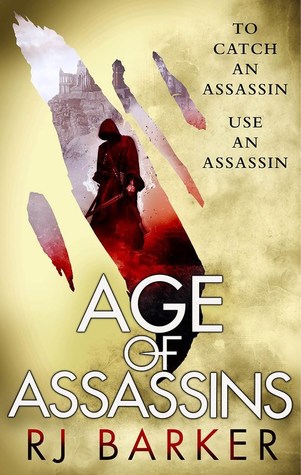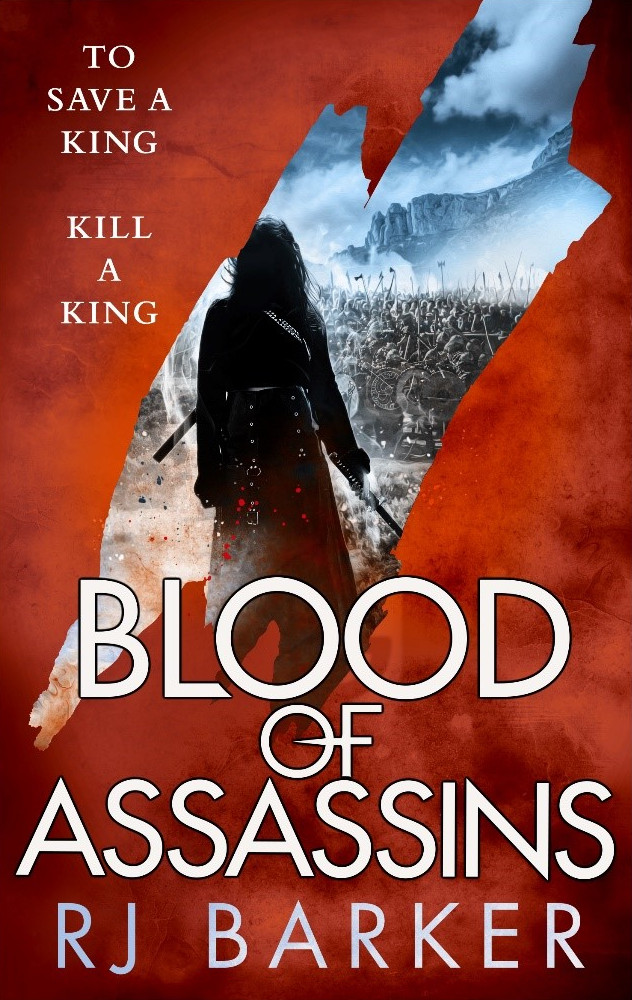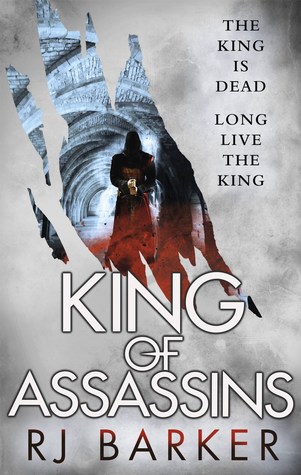Interview with RJ Barker (KING OF ASSASSINS)
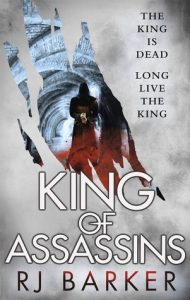
Warning: this interview may contain spoilers for the Wounded Kingdom trilogy!
Welcome back to the Hive, RJ! Thank you for stopping by, again. It seems like just yesterday you were here talking about ‘Blood of Assassins’, and here we are ready to discuss ‘King of Assassins,’ the final book in the Wounded Kingdom trilogy.
Three books in less than twelve months. It must’ve been a whirlwind year for you! Now that the full series is out there, how do you feel?
Tired…Actually, no, that’s a complete lie. Excited. Thrilled that I’ve done it and ready to get on with something new now. I finished King of Assassins ten months ago now so it’s been a while for me.
Now that ‘King of Assassins’ is out there in the wild, what can readers expect from it?
It’s darker, much darker than the first book, darker than the second too but Girton is no longer as angry so he’s not as dark. There’s been an evolving viewpoint throughout the series where the narrative has become more complex as the books moved along, so this is the most complex of the three books, and also the most tense and the most revelatory. And, if we’re judging by the critical reception, also the best.
It feels like we (as readers) have come such a long way in such a short space of time. In book one, ‘Age of Assassins’, you introduced us to a young Girton Clubfoot in the ‘coming of age’ years; in two, ‘Blood of Assassins’, you brought us a tale of adulthood angst, anger and anguish; and in book three, ‘King of Assassins’, you turned the tables again, with Girton doing what he has to do, not because it’s the right thing, but because he’s the only one who can do it.
It feels like we’ve witnessed the rise and fall of Girton Clubfoot – and I miss him already. Do you? How did it feel to write such a complex and convincing character?
I don’t really miss him because he still feels like a character I can access at any point, it is a very easy voice for me to fall into. And also I don’t look back, the most exciting and involving part of a book is the writing and editing because that’s when it’s still alive – I can still change it and morph it into the shape I want. Once that’s finished it’s a lot less interesting to me because I’m done with it. The real interest then is what readers get from it and bring to it, and finding that out and talking to people about how they perceived it and what clicked with them, because that’s how the book keeps on living, by bringing the story to other people and letting them live it. It’s not really mine now, I mean, the intent and ideas with which I wrote it won’t change. But maybe I’ll discover things I didn’t know were there through the experience of readers, which is an exciting thing in itself.
And how did it feel to write him? Good. Sad at times, sometimes I laughed with him (and at him). During Blood of Assassins I often wanted to physically slap him, and at times I just wanted to tell him everything would be all right. He feels very real to me and I always know how he would react in any situation . And lastly I like him, I couldn’t have written the books if I didn’t like him. I know the Wounded Kingdom books are quite dark in a lot of ways but Girton isn’t and he is always trying to do what’s right really. Even when he is in a place where maybe there aren’t any good choices, only the least bad ones.
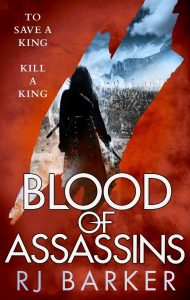 As much as I love Girton, your other characters are equally memorable. Merela, Aydor, Rufra and others. They each embark on their own journeys throughout the series, and it’s fair to say that the people they turn out to be are very different to those they started out as.
As much as I love Girton, your other characters are equally memorable. Merela, Aydor, Rufra and others. They each embark on their own journeys throughout the series, and it’s fair to say that the people they turn out to be are very different to those they started out as.
Whilst I’ll get to Aydor in a moment (who is my FAVOURITE), there are two characters in particular who stole the limelight for me in book 3 – the brothers Barin and Borros. These two couldn’t be more different, but their fates are intertwined throughout the series, taking twists and turns that I had never imagined you’d take. Was their destiny determined from the start, or did it come as much as a surprise to you as it did to me?
To a degree, everything is a bit of a surprise to me. I just did an interview where I was saying how I have a very clear meta idea of the story, I know where I am going in the overall arc of three books but the smaller things, like the plot of each book, are generally a mystery. I put the twins in to Age of Assassins on a whim, I liked the idea of these beautiful identical twins who were actually quite different. Then when I got to Blood of Assassins and it was about a civil war I knew I’d handed myself a lovely little metaphor. And, of course, by this point one looks like a monster and one looks like an angel but they act in very different ways. I didn’t know where their story was going but I knew they were interesting, and how people end up in the place they are in and how that is influenced by the events of their past is a constant theme of the book.
Speaking of character development – none surprised me more than Aydor (STILL MY FAVOURITE). I loathed him in AoA, loved him in BoA, and now lord him by the end of KoA. WHY TOY WITH MY EMOTIONS LIKE THAT? Or, more appropriately, how did Aydor’s character come about, and why did you choose the path for him that you did?
He was meant to die at the beginning of Blood of Assassins. I knew why he was the way he was, but as a character I kind of thought he was done in Age of Assassins, he was the counterpoint child to Girton for that book and cos we see him through Girton’s eyes he was always painted quite simplistically – because that was Girton’s perception of him. I sort of intended a thrilling escape and a bit of a showdown but by the time I’d started writing BoA I was already thinking that was a bit dull. Then I wrote the drunk scene and it just wrote itself, this story poured out of him and I liked the idea of taking him forward and making him more complex, so the reader can see how .very. stubborn. Girton is being in refusing to accept people can be more than he thinks. As to how that book ends, and I won’t give it away here, I was never 100% sure how it was going to go until I wrote it. But I talk more about Aydor in the afterword of King of Assassins so if you want the real low down, dear reader, you’ll have to get the book…
And I would be remiss not to talk about Merela. Her relationship with Girton is a mainstay in the series, and looking back, it’s the glue that holds not just Girton’s story, but Girton himself together. I can even hear his ‘One, my master – two, my master’ in my head, now. Their relationship is as heartfelt as it is heart breaking. What inspired Merela Khan?
Being a parent. I think of her as the avatar of that fierce parental love. Though not just being a parent, being a good parent because in Age of Assassins we get Girton and Merela’s relationship which is very healthy (within the parameters of what can be healthy when you kill people for a living), set against that of Aydor and Adran. There’s no doubt Adran loves her son but that love is polluted by ambition, she see her child as part of her where Merela encourages Girton to be who he is. She’s there for him, she’ll protect him but she’s trying to help him find his way and that’s a very healthy way to be. She’s a compass he can steer by, not a path he has to follow. Though she is also quite manipulative, but parents are.
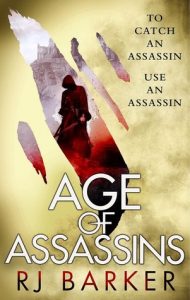 Last character question – I swear – but in the afterword, you mentioned that you could write a whole other afterword on Xus, the antlered mount of Merela and Girton (#teamXus). The thing is, for something that doesn’t talk, doesn’t appear in every scene, and isn’t the most approachable of characters, Xus plays a huge part in the series and I feel that I know and love him as much as Girton and others (#teamXus).
Last character question – I swear – but in the afterword, you mentioned that you could write a whole other afterword on Xus, the antlered mount of Merela and Girton (#teamXus). The thing is, for something that doesn’t talk, doesn’t appear in every scene, and isn’t the most approachable of characters, Xus plays a huge part in the series and I feel that I know and love him as much as Girton and others (#teamXus).
Now, I’m not saying ‘write an entire afterword dedicated to Xus’ here (because if I did, I know you would), but if there was something you’d like to write/say about Xus, what would it be?
I’m sort of fascinated by alien presences and other ways of communication and Xus was part of that. And also, anyone who has had a pet has known those moments when you’re having an off day or you’re a bit down and you go to them and they seem to understand. So Xus was this sort of (mostly) non-judgemental presence for Girton, a safe place, but I also wanted him to have a real personality, so you’d wonder just how intelligent he was, and how much he understood. I’m not going to tell you that, of course, that’s for the reader to judge.
How much planning went into the ‘of Assassins’ books? As a whodunnit I imagine you have to either plan each and every turn and fork in the road, or was it a ‘ooo, this way looks fun’ whilst slinging bread crumbs behind you?
You SO know the answer to this, Mike! No planning! None. Well, okay, maybe a tiny bit. I might do a Paddington hard stare at you. Anyway. I know who did it, because I have to know that so I can leave breadcrumbs, not clues so much, I don’t write the sort of book where you can really work out the bad guy beforehand by anything more than a guess or in hindsight[1]. But at the same time I’m always thinking four or five chapters ahead of what I am writing and I will have a few pivotal scenes in mind that I know have to happen – the battle in the centre of Blood of Assassins for instance. I knew that was going to happen and where and why because a couple of things happen in it that are pivotal but I did not how it would unfold.
I always want the reader to be a bit ahead of Girton, he’s not a great detective by any means. And it’s a nice feeling for the reader to be thinking I KNOW WHAT YOU SHOULD BE DOING, and it also creates a bit of tension. Then I can hide stuff behind that.
And is this true for the series as a whole? By the end of ‘King of Assassins’ the reader will be kicking themselves (like I still am) for not seeing what was right in front of them all along. Was the end and its reveals planned from the start? How much of the story changed over the course of the books?
Not a huge amount. I always knew where Merela and Girton had come from and where they were going[2] even if I didn’t know quite how they would get there. Things happen at the end of the final book that were always going to happen as well as things that I didn’t realise needed to happen until I got there, and that’s good because I would get bored otherwise. There was always a big plan, the books are about balance, they work like a set of scales. King is a dark mirror of Age in story, and format. Blood of Assassins is a point of balance, there’s a moment that sits metaphorically and physically in the centre of the trilogy, where Girton has to choose whether to be who he is or not, a point of balance. You can’t do a thing like that without knowing you want to.
This isn’t the end though…is it? In the afterword you tease that you might one day return to the Wounded Kingdom. Will you?
I’ve nothing against the idea. Though I do like to always feel like I am moving forward and I have so many ideas[3] I feel like I should be going to them. Part of me would like to write some very straight whodunnits in the Wounded Kingdom world and I think that might be fun, to write it with Girton and Merela, or maybe other characters. It might be a fun thing to do but in the end it would depend on whether people were interested. Maybe some short stories.
So, what IS next for RJ Barker? I know I’ve asked you this before, during the ‘Blood of Assassins’ interview, but have you got anything more you can share with us?
The next thing is Big Ships. It’s much more of an adventure book than the Wounded Kingdom books, and in a world invented from the ground up, rather than one that’s very similar to feudal Europe/Japan. I wanted to use my imagination a bit more. My agent described it as ‘totally different and still undoubtably you’. Which is a good thing, I hope.
Thank you for answering my questions, RJ. Before we go, if there was ONE LINE from ‘Blood of Assassins’ you could share with readers, what would it be, and why?
MIKE! I CAN BARELY REMEMBER LAST WEEK. I was talking with my other half about this actually. And saying how hard I find it to pull quotes from the book that are cool because all the humour and emotional punch in the books comes from folding the people and plot and world back in on itself. They don’t really work outside of the books unless you know the books because the intention is to write something completely self contained. I struggle to read anything that’s second world fantasy if it references our world, it just knocks me straight out of the book.
“Fitchgrass, Fitchgrass, Tied up in stitchgrass.”
But, I am also quite contrary and I often find that the things I love the most are the things that, maybe, aren’t quite as popular with other people. That’s from one of the interludes in BoA and I love them cos they aren’t particularly written to make sense as much as they are to provide a feeling of disquiet, and I like to try and do that with words sometimes, to make them about feeling rather than story. A novel is a thing of sense and logic and fitting parts together and I like to break away from that every so often – even when you know it’s not going to be for everyone. So I did it and it brings me great joy.
- Noo, no you didn’t.
- If you read Age of Assassins after reading king of Assassins you’ll see…
- HUBRIS.
RJ Barker is the author of the WOUNDED KINGDOM trilogy, available now.

